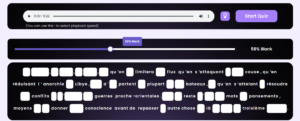Recently I’ve been thinking about how to quantify “difficulty” on this site. I’ve added several ranges of wpm to help you sort and find the best fit content for your ear. Find the in the top right menu.
What is the average WPM for French speech?
As always, it depends.
In the US, I’d argue that our average speaking rate is around 130 words per minute (wpm). Mine might be a bit faster, but that’s a mix of excitement and caffeine.
This blog post has the breakdown as conversational 120-150; radio and presenters 150-160. When I google average words per minute of French, it’s something like 195 words per minute. Nearly 30% faster than English speakers.
It seems that generally speaking it’s around 200 words per minute. That seems to be thanks to the liaisons, contractions, and the like. It also is just common for speech to be a bit faster in conversation.
Not the greatest news for those of us grappling with the language!
Content on this site: The averages vs the outliers

On every post, I’ve always tracked the number of words and the total length of time. And this got me thinking, what is the average speaking rate for French?
What’s interesting to me, is that although average speaking rates are supposedly close to 200 words per minute, the average for content on this site is 148.6 wpm.
Why’s that?
My hunch is it has to do with “podcasts” as the medium. The majority of the 142 clips on site is from podcasts. For recorded audio like podcasts, the standard recommendation is to aim for 150 words per minute. At least, for English.
Not only that, the podcasts I’m using are targeting learners, so the speech is generally a bit slower. Non-learner focused podcast clips from Manger average 195 wpm and from Geopolitique average 178 wpm. Both closer to that “French average WPM”.
The clips coming from Revue de presse Française (3 total on site) average 194 wpm. It’s also recorded content, but at a much higher pace. This is closer to the wpm we might hear on French talkshow / TV. The style of Revue de Presse is also a bit more rushed, so the pace will be faster.
On site, I’ve started tagging clips into categories. While the French average is something like 200 wpm, I haven’t called that “average” or “moderate” on site. I’ve stuck with an Anglophone mentality, where 160+ is fast, 200+ is very fast. sub-120 wpm is slow.
Let me know if you have feedback or disagree with the way I’ve broken it down. My goal is to add a little science behind “beginner, intermediate, and difficult”. I’m not a teacher, so I can’t really judge what’s best for beginners, but I can go on hard facts.
What does this mean for learning?
It seems there’s quite a hill to climb. My goal is to move from feeling comfortable with Paris o’clock (123 wpm avg) and Balades (151 wpm avg) on to podcasts with rates closer to 200. I believe it’s only then that I’ll be far more capable in country speaking with locals.
The Fastest Clips on Bitesize French
Are you interested in really challenging yourself? I’m amazed how fast spoken French can be at times. It’s at the speed of an English speaking auctioneer, 200+ words per minute, but rather than being in a specialized location like an auction, it’s a TV show, news program, or advert.
Here’s a clip that is almost at 250wpm, this is from a Burger King advertisement.
Obviously, French as a language lends itself to speed. Words can be combined, truncated, and are liaised together. That said, it still seems like there is far more content delivered in a similar breath, than English.
I always find that keeping up with quick speech is difficult at first. With enough practice and experience, it is getting easier.
How is it that fast English is 170wpm, fast French is 225wpm, individuals in France are able to comprehend such rapid speech?
Exposure to a language, particularly throughout childhood, is one of the most basic requirements to developing the ability to interpret fast speech. According to a study (published in the “Journal of Speech, Language, and Hearing Research“) conducted in the United Kingdom: because of this exposure, people are able to acquire accustomed with the rhythm, intonation, and pronunciation of the language, which makes it easier to pick up the meaning. It’s still easy, even when individual words are difficult to discern from one another. (Helping learners discern individual words is what we hope to deliver in every quiz!)
When it comes to French people, they are exposed to rapid speech at a young age through a variety of sources, including television, movies, and other types of media. This affects their speech patterns at an early age. They are able to improve their listening skills as a result of this exposure, as well as their familiarity with the rhythm and intonation of rapid speech. In other words, to a French native speaker, 249 words per minute isn’t as fast as we think!
Listeners are also able to pick up on context cues and nonverbal communication, such as gestures and facial expressions, which can help to clarify the meaning of fast speech even when individual words are difficult to distinguish, according to the findings of another study that was published in the “Journal of Memory and Language.” Though, it’s important to mention that Burger King ad with the fries posted above doesn’t have body language or facial expressions to rely on, they are talking French Fries!
Comprehending super fast French speech is a barrier for many leaners. Nevertheless, it does become easier with practice and exposure to the language. Start with slower clips, and constantly challenge yourself with faster clips whenever possible!
Here is the new fastest clip on site as of 2024…
35 words in 5 seconds, clocking in at 410 words per minute. It is among the elite “ludicrously fast” posts on site. While this is a great way to improve your French, don’t let it hurt your confidence, this is a native speaker speaking to other locals and taken out of context! Up for the challenge?
The latest on site two years on…
When I made this post on the blog, there were 142 posts on site. Now we have 640 clips on site from music, podcasts, advertisements and more. I’m trying to include a bigger blend of various forms of “French in Real Life“. The French you’ll hear in the real world, not just the French your teacher understands.
When I’m learning a language, it’s generally easy for me to understand a teacher. English teachers typically have clear and patient annunciation. I think the same is true of Chinese, Spanish, and French teachers. They are used to non-native speakers, and their speaking (especially when speaking to someone non-native) matches. That’s nothing against them, of course, it just makes sense. But that’s not how the language exists in the real world.
Now with over 640 clips on site, we have a better sample to explore. The average words per minute on the site now is 169. Some podcasts like Vivons Heureux clock in at 210 average. The advertisements are generally well over 200 wpm. There are opportunities to start slow and work up. Start with Balades, Inner French and then work your way up to a clip from more challenging.
Until then, you can choose what’s best for you by speed:
Slower clips (less than 120 wpm)
Moderate clips (120 to 159 wpm)
Very Fast clips on site (200+ wpm)
Extremely Fast Clips (250+ wpm)
Ludicrously Fast Clips (300+ wpm) – not for the feint of heart!










Good I should definitely say I’m impressed with your web site. I had no trouble navigating through all tabs and related info. It ended up being truly easy to access. Excellent job..
I’ve been gone for some time, but now I remember why I used to love this web site. Thanks, I’ll try and check back more frequently. How frequently do you update your site?